Our Economy Depends on Migratory Birds in Many Ways
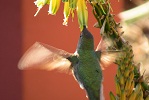   
Despite our historic relationships with migratory birds, we have in many ways only recently discovered the numerous indispensable roles they play in both local and global economies. The links migratory birds have with agriculture are complex, but it is clear now that birds once only seen as pests to farmers also provide economic services as well. Many migratory birds are also hunted for food and traditional recreation. Also, many groups and cultures continue to rely economically on migratory birds for their livelihoods, including through employment in the growing global ecotourism industry.
Migratory Birds as Biodiversity Indicators
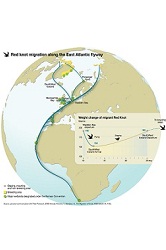
Biodiversity indicators produced by government agencies, academia and NGOs are an important instrument designed to improve environmental management and promote sustainable development.
Migratory birds are excellent indicators of the state of our environment. Like many other species, their migration patterns match their needs regarding the availability of resting, breeding and feeding sites. As a result of climate change, they are altering the timing of elements of their life-cycle.
Migratory Birds as Health Wardens
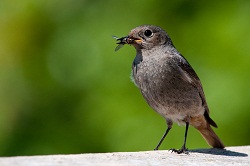
Migratory birds play an important part in the ecosystem. They eat insects and rodents which saves farmers money they would otherwise spend on pesticides and crop protection measures. By acting as natural controls, birds help regulate pests by reducing populations of potentially harmful insects such as caterpillars, weevils, cutworms, beetles and flies.
Ecological scavenging services provided by vultures tend to be underestimated, and they play a critical role in nutrient cycling. Being highly specialized to rapidly dispose of large carcasses, vultures act as health wardens in the avian animal kingdom. By attracting other scavengers to decomposing carcasses, they reduce the risk of contamination by pathogens. Scientists are studying the impact of the continuous decline of vultures from West Africa to Southeast Asia. It is though that there is in part due to the poisoning of their prey.
Migratory Birds as Pollinators
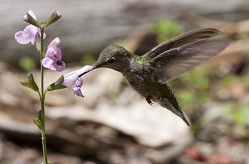
Migratory birds perform important ecological regulating services. They have a vital role in seed dispersion and flower pollination. For example, Grassland birds rely on grasses as their nesting habitat and help to maintain their preferred ecosystems, which are in turn considered highly valuable as a wildlife refuge. By dispersing grassland seeds, these birds act as gardeners of these ecosystems. [Watch a Video about Seed Dispersal]
However, as grassland birds require open grassy areas, such as hay-fields, prairies or pastures, expanding agricultural activities and the timber industry have become two of the major threats to these birds. Fortunately, recognizing the benefits of grassland birds for healthy grassland, practices of rotational grazing by dairy, sheep and beef farmers have been encouraged to increase the populations of grassland birds.
Migratory Birds and Wetlands
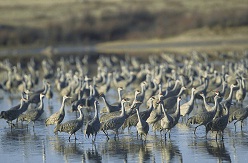
The UNEP Siberian Crane Wetlands Project to sustain the endangered Siberian Cranes and millions of other migratory waterbirds helped restore an area of seven million hectares - ecosystems of high environmental and economic importance.
Not only do migratory birds such as the Siberian Crane rely on wetlands to rest and to feed, but also countries need wetlands to supply drinking water to millions of people. Wetlands also act as carbon sinks helping to combat climate change, serve as flood defences and help to sustain productive fisheries.
Migratory Birds and Fertilizers
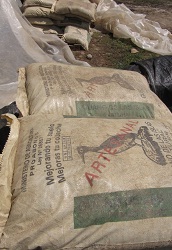 Sea birds can also produce guano, a substance considered as one of nature's best fertilizers. In the Quechan language, guano means "the droppings of sea birds". Resulting from a complex process that starts with living plants that are eaten by insects, which are then consumed by fish that are finally digested by birds, guano is deposited on the floors of caves, rocks or ground in large quantities around bird colonies. Sea birds can also produce guano, a substance considered as one of nature's best fertilizers. In the Quechan language, guano means "the droppings of sea birds". Resulting from a complex process that starts with living plants that are eaten by insects, which are then consumed by fish that are finally digested by birds, guano is deposited on the floors of caves, rocks or ground in large quantities around bird colonies.
The Incas used to collect guano to enrich soil. They treated guano as a valuable material by restricting access to it and punishing any disturbance to the birds with death. The United States also recognized the value of guano by passing an Act in 1856 that gave protection to any citizen that discovered a source of guano. Characteristics of guano provide for improving the texture of the soil, clearing toxins and speeding up decomposition.
Falconry
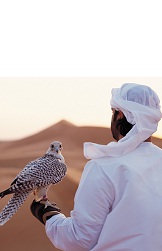
The roots of falconry lie in Asia, and date back to 2000 BC and it is still a revered practice today. Falconry has been established over the centuries as an art of hunting with trained birds of prey, which was recognized by UNESCO as global cultural heritage in 2010. The increasing demand for falcons has led to a massive decline of the species of up to 60 per cent in the last 20 years. However, falconry also promotes the conservation of raptors and their prey through preservation of natural habitats and captive breeding. Recently falconers have played an increasingly important role in conserving wild raptors and reintroducing species that had totally vanished.
Legal trade in the Saker Falcon is regulated by CITES (the Convention on International Trade in Endangered Species of Wild Fauna and Flora). The Wildlife Conservation Society reported that in the 1990s, high demand of rare species made illegal falcon trade very profitable. At the end of the chain, market prices reached US$20,000–40,000 for an adult female Saker Falcon in the Middle East.
Birdwatching and Ecotourism
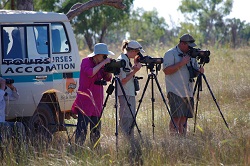
Bird watching is a highly popular recreational activity and greatly contributes to the growing global ecotourism industry. Birding is the most rapidly growing sector of ecotourism, a billion dollar industry, which again makes migratory birds economically important for human beings. Hundreds of thousands of birdwatchers travel to various places in the world to watch birds, hoping to glimpse rare species. Considerable economic benefit is achieved by disbursing funds for travelling, accommodation and entrance fees.
Also, the production of birding equipment such as binoculars, cameras is an important multi-million dollar industry. A great diversity of bird watching literature helps birdwatchers and interested laypeople to explore the fascinating world of migratory birds. This type of ecotourism educates people about the importance of migratory birds and ecosystems. Ecotourism can help conserve important habitats that helps preserve not just migrating birds but biodiversity on a much great scale.
Migratory Birds and Hunting
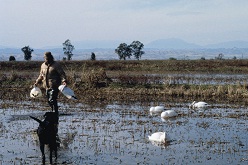
Hunting is an important socio-economic activity around the globe and billions of birds are hunted every year. In many cases, unsustainable hunting is causing a decline in migratory bird populations and in order to prevent more declines it is important to address this issue along entire migration routes. For example, species and populations that breed in Europe are affected by unsustainable hunting in their African wintering grounds and along their migration routes. Any conservation efforts to protect these birds from decline would need to address unsustainable hunting along the entire migratory bird flyway.
Many migratory bird species are threatened by unsustainable hunting and poaching in many parts of the world, especially in Africa, South America and Central Asia. Since these birds are shared by all nations along the flyways, these practices affect migrating birds and people on a global scale.
|


